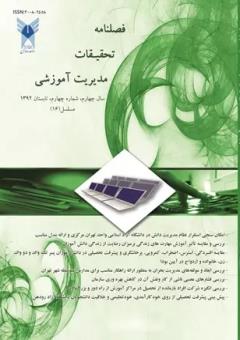طراحی الگوی تربیت شهروندی بر اساس اسناد بالادستی
محورهای موضوعی : مدیریت آموزشیسحر بختیاری 1 , نجمه وکیلی 2 * , مهشید ایزدی 3 , مهدی دوایی 4
1 - گروه علوم تربیتی،دانشگاه آزاد اسلامی،واحد تهران مرکزی،ایران
2 - گروه علوم تربیتی،دانشگاه آزاد اسلامی،واحد تهران مرکزی،ایران
3 - گروه علوم تربیتی،دانشگاه آزاد اسلامی،واحد تهران مرکزی،ایران
4 - گروه علوم تربیتی، دانشگاه آزاد اسلامی، واحد تهران مرکزی،ایران
کلید واژه: الگو, تربیت شهروندی, اسناد بالادستی, روش کیفی,
چکیده مقاله :
هدف پژوهش حاضر، طراحی الگوی تربیت شهروندی بر اساس اسناد بالادستی است و این پژوهش از نظر هدف بنیادی - کاربردی و از نظر نوع کیفی است. دادههای موردنیاز به روش اسنادی و با رعایت اصل اشباعشدگی از میان پنج سند تحول بنیادین آموزشوپرورش، برنامه ششم توسعه، منشور حقوق شهروندی، الگوی اسلامی ایرانی پیشرفت و برنامه درسی ملی گردآوریشدهاند. تربیت شهروندی در جامعه بشری بخصوص کشور عزیزمان ایران به آن شکلی که نیاز است توجهی به آن نشده ویکی از موارد لازم و ضروری در جهت رشد و پیشرفت جامعه تربیت شهروندی است. پس برای تدوین الگوی تربیت شهروندی، اسناد مورد تأیید کشور بالاخص 5 سند مورداستفاده در این پژوهش بسیار مناسب است. روش تجزیهوتحلیل دادهها، کدگذاری از روش تحلیل مضمون و طی شش گام به روش براون کلارک انجام شد. در بخش یافتهها مؤلفهها و زیرمؤلفههای تربیت شهروندی بر اساس اسناد بالادستی، بامطالعه و تحلیل اسناد و مدارک علمی موجود استخراج شدند. الگوی تربیت شهروندی شامل چهار مؤلفه اصلی (بعد اجتماعی - بعد فرهنگی - بعد سیاسی و بعد اقتصادی) و 19 زیر مؤلفه (احترام به قانون و لزوم رعایت آن، بالابردن امکان انجام کارهای گروهی و مشارکتی، ارزشهای اجتماعی مرتبط بااخلاق و...) که در پژوهش فوق به طور کامل لیست شد الگوی تدوین شده مناسب به جهت ارائه آن به مراکز آموزشی، مدارس و بهویژه معلمان است.
The purpose of the current research is to design a model of citizenship education based on upstream documents, and this research is fundamental-applicative in terms of purpose and qualitative in terms of type. The required data have been collected by documentary method and in compliance with the principle of saturation from among the five documents of the fundamental transformation of education, the sixth development plan, the charter of citizenship rights, the Iranian Islamic model of progress and the national curriculum. Citizenship education in the human society, especially our dear country Iran, has not been paid attention to as it needs to be. So, for developing the model of citizenship training, the documents approved by the country, especially the 5 documents used in this research, are very suitable. The method of data analysis, coding was done by thematic analysis method and in six steps by the Brown-Clark method. In the findings section, the components and sub-components of citizenship training were extracted based on the upstream documents, by studying and analyzing the available scientific documents. The citizenship education model includes four main components (social dimension - cultural dimension - political dimension and economic dimension) and 19 sub-components (respect for the law and the need to comply with it, increasing the possibility of doing group and collaborative work, social values related to ethics, etc.) which was completely listed in the above research, the prepared model is suitable for presenting it to educational centers,schools and especially teachers.
آشتیانی، ملیحه؛ فتحی و اجارگاه، کورش. (1385). لحاظکردن ارزشهای شهروندی در برنامه درسی برای تدریس در دوره دبستان، فصلنامه نوآوریهای آموزشی، شماره 17، 92-67
آقازاده، احمد. (1385). اصول و قواعد حاکم بر تربیت شهروندی و بررسی سیر تحولات ویژگی های این گونه آموزش ها در کشور ژاپن، فصلنامه های نوآوریهای آموزشی، شماره 17. سال پنجم، صص 66-45
بیات، خلیلالله. (1396). سیر پیدایش، تحول و تدوین حقوق شهروندی در دوره مشروطیت.پایان نامه کارشناسی ارشد. دانشگاه شهید بهشتی. دانشکده ادبیات و علوم انسانی
پرنده،رضوان.(1402).مهارتهای تربیت شهروندی،تهران:مهد دانش
علیخانی فرا دنبه، معصومه. (1401). کتاب "تعلیم و تربیت شهروندی"،مشهد : جالیز،ص101
قائدی، یحیی. (1395). تربیت شهروند آینده. فصلنامه نوآوریهای آموزشی، شماره 17، سال پنجم، 183- 211
قیاسی، لاله (1397).کتاب مدیریت تربیت شهروندی براساس آموزه های دینی،تهران :آریا دانش
کریمی، امیر، رحمتی، رباب . (1401).فراتحلیل مطالعات تربیت شهروندی در آموزش و پرورش ایران.فصلنامه پژوهش در آموزش مطالعات اجتماعی ،دوره 4،شماره 2،صص159-29
کشاورز، يوسف، امين بيدختي، علیاکبر، محمدیفر، محمدعلي. (1397). بررسي ميزان توجه به مؤلفههاي شهروندي جهاني در آموزشوپرورش ايران (مطالعة موردي اسناد بالادستي نظام آموزشوپرورش)، نوآوريهاي آموزشي، 17(68)، 91-106
موچشی، لطف اله ساعد، سلیمی، جمال، عزیزی، نعمت اله. (1398). مطالعه مفهوم و ابعاد شهروندی دانشگاهی در نظام آموزش عالی ایران دلالتهایی در برنامهریزی آموزشی، دوفصلنامه مطالعات برنامهریزی آموزشی، 8(16)، 1-20
Banks, j .A . (2018). Diversity, group identity. And citizenship education in a global age. Educational researcher, vol.37, no.3, pp.129-139. available at: www.er.aera.net
Blyth.W.A.L(2017).Development,Expreince and curriculum in primary Education.London Journal of Routledge,190. Collado, M.C and Atxurra, R.L. (2016). Democratic citizenship in textbooks in Spanish primary curriculum. Curriculum studies, vol.38, no.2, pp 205-228
Keating, A., Ortloff, D. H., & Philippou, S. (2009). Citizenship education curricula: the changes and challenges presented by global and European integration. Journal of Curriculum Studies, 41(2), 145-158
Keser, F., Akar, H., & Yildirim, A. (2011). The role of extracurricular activities in active citizenship education. Journal of curriculum studies, 43(6), 809-837
Unesco (2018). Educational innovation and information, International bureau of education. CH-1211.Geneva, pp 1-7 Nanggala, A. (2020). Citizenship Education as a Democracy Learning for Students in Higher Education. IJECA International J. Educ. Curric. Appl., vol. 3, no. 1, pp. 69–80

